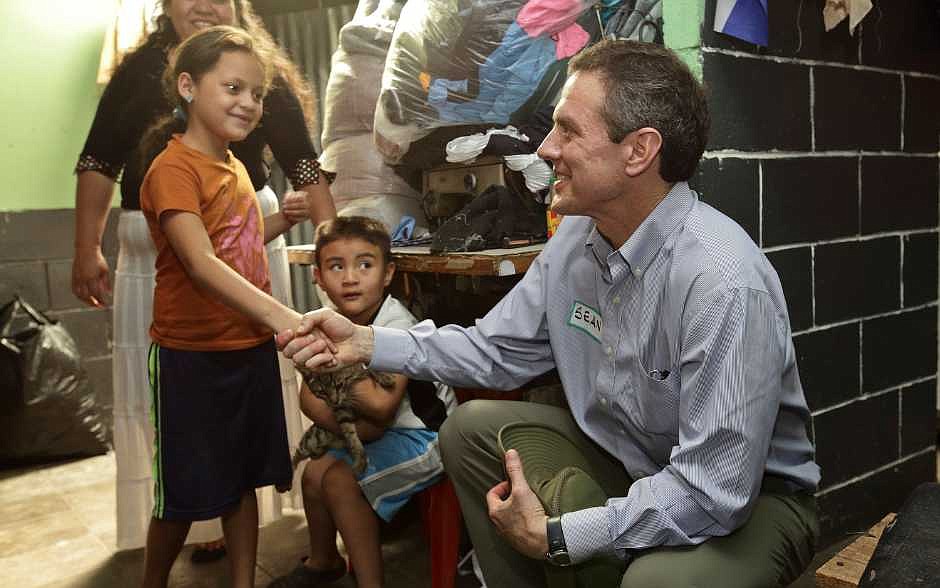CRS asks Congress to increase U.S. foreign aid budget, citing climate change's global impact
April 21, 2023 at 5:59 p.m.

WASHINGTON OSV News – Catholic Relief Services, the U.S. Catholic Church's international aid agency, urged congressional lawmakers to increase funding for the United States' international humanitarian aid and development assistance in the 2024 foreign aid appropriations process.
In written testimony submitted April 14 to the U.S. House Subcommittee on State, Foreign Operations, and Related Programs, CRS president and CEO Sean Callahan cited the impacts of climate change as one of the reasons the U.S. should increase its foreign aid efforts.
"We witness the devastation of drought and desertification, flooding and cyclones, and food insecurity and famine," Callahan said in his testimony. "We urgently take up the pope's call to combat climate change and ensure food security for all.
Farmers around the world, Callahan said, are "seeing their livelihoods depleted by record temperatures, high variability of rainfall, and more frequent and intense weather events."
"Overwhelmingly, those most impacted are the world's poorest and already most vulnerable communities, who have contributed the least to climate change," he said.
CRS urged House lawmakers to significantly increase funding beyond what the Biden administration is seeking in the areas of disaster and refugee assistance, maternal and child health, and efforts to combat tuberculosis and malaria
CRS also urged lawmakers to prioritize localization in relief efforts, shifting more funds directly to local entities.
[[In-content Ad]]
"To care for our common home and battle inequality and food insecurity, not only what we do, but also how we do it is critical," Callahan said. "International assistance must shift more funding directly to local entities and must empower local organizations to implement, evaluate, and own their own development."
The Biden administration is seeking $63.1 billion for the Department of State and the U.S. Agency for International Development, according to its fiscal year 2024 request. A budget justification memo from USAID said the agencies "advance our vision of a free, open, secure, and prosperous world and deliver on the issues that matter most to the lives and livelihoods of Americans."
"The President's FY 2024 budget request of $63.1 billion for the Department of State and USAID will make it possible for us to continue to promote U.S. national interests and lead the world in tackling global challenges," the memo said
CRS, however, also made clear that Congress needed to maintain the Helms Amendment, which prohibits the use of foreign aid funding for abortion, in the upcoming budget.
"While we are committed to working with Congress to foster love, justice, and peace, we have grave concerns about providing taxpayer funding for activities inconsistent with the Catholic faith and basic human rights," Callahan stated.
"Integrating programming elements that many consider morally unacceptable is not in the best interest of the U.S.," he said, "and would exclude providers that have strong legitimacy and credibility with local partners."
Kate Scanlon is a national reporter for OSV News covering Washington. Follow her on Twitter @kgscanlon.
Related Stories
Wednesday, December 24, 2025
E-Editions
Events
WASHINGTON OSV News – Catholic Relief Services, the U.S. Catholic Church's international aid agency, urged congressional lawmakers to increase funding for the United States' international humanitarian aid and development assistance in the 2024 foreign aid appropriations process.
In written testimony submitted April 14 to the U.S. House Subcommittee on State, Foreign Operations, and Related Programs, CRS president and CEO Sean Callahan cited the impacts of climate change as one of the reasons the U.S. should increase its foreign aid efforts.
"We witness the devastation of drought and desertification, flooding and cyclones, and food insecurity and famine," Callahan said in his testimony. "We urgently take up the pope's call to combat climate change and ensure food security for all.
Farmers around the world, Callahan said, are "seeing their livelihoods depleted by record temperatures, high variability of rainfall, and more frequent and intense weather events."
"Overwhelmingly, those most impacted are the world's poorest and already most vulnerable communities, who have contributed the least to climate change," he said.
CRS urged House lawmakers to significantly increase funding beyond what the Biden administration is seeking in the areas of disaster and refugee assistance, maternal and child health, and efforts to combat tuberculosis and malaria
CRS also urged lawmakers to prioritize localization in relief efforts, shifting more funds directly to local entities.
[[In-content Ad]]
"To care for our common home and battle inequality and food insecurity, not only what we do, but also how we do it is critical," Callahan said. "International assistance must shift more funding directly to local entities and must empower local organizations to implement, evaluate, and own their own development."
The Biden administration is seeking $63.1 billion for the Department of State and the U.S. Agency for International Development, according to its fiscal year 2024 request. A budget justification memo from USAID said the agencies "advance our vision of a free, open, secure, and prosperous world and deliver on the issues that matter most to the lives and livelihoods of Americans."
"The President's FY 2024 budget request of $63.1 billion for the Department of State and USAID will make it possible for us to continue to promote U.S. national interests and lead the world in tackling global challenges," the memo said
CRS, however, also made clear that Congress needed to maintain the Helms Amendment, which prohibits the use of foreign aid funding for abortion, in the upcoming budget.
"While we are committed to working with Congress to foster love, justice, and peace, we have grave concerns about providing taxpayer funding for activities inconsistent with the Catholic faith and basic human rights," Callahan stated.
"Integrating programming elements that many consider morally unacceptable is not in the best interest of the U.S.," he said, "and would exclude providers that have strong legitimacy and credibility with local partners."
Kate Scanlon is a national reporter for OSV News covering Washington. Follow her on Twitter @kgscanlon.









